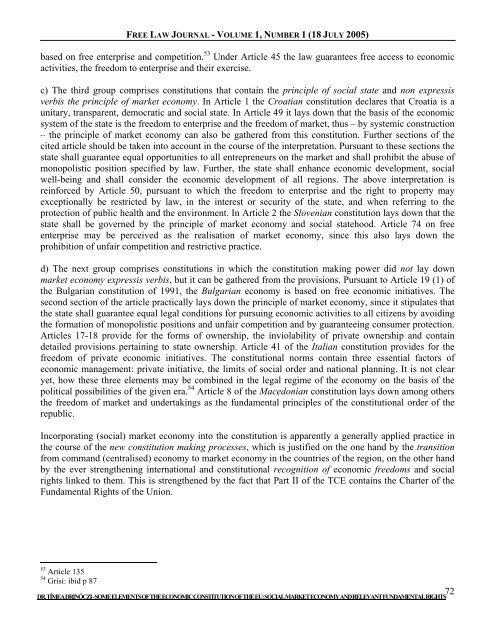Free_Law_Journal-Vol.. - Free World Publishing Inc.
Free_Law_Journal-Vol.. - Free World Publishing Inc.
Free_Law_Journal-Vol.. - Free World Publishing Inc.
Create successful ePaper yourself
Turn your PDF publications into a flip-book with our unique Google optimized e-Paper software.
FREE LAW JOURNAL - VOLUME 1, NUMBER 1 (18 JULY 2005)<br />
based on free enterprise and competition. 53 Under Article 45 the law guarantees free access to economic<br />
activities, the freedom to enterprise and their exercise.<br />
c) The third group comprises constitutions that contain the principle of social state and non expressis<br />
verbis the principle of market economy. In Article 1 the Croatian constitution declares that Croatia is a<br />
unitary, transparent, democratic and social state. In Article 49 it lays down that the basis of the economic<br />
system of the state is the freedom to enterprise and the freedom of market, thus – by systemic construction<br />
– the principle of market economy can also be gathered from this constitution. Further sections of the<br />
cited article should be taken into account in the course of the interpretation. Pursuant to these sections the<br />
state shall guarantee equal opportunities to all entrepreneurs on the market and shall prohibit the abuse of<br />
monopolistic position specified by law. Further, the state shall enhance economic development, social<br />
well-being and shall consider the economic development of all regions. The above interpretation is<br />
reinforced by Article 50, pursuant to which the freedom to enterprise and the right to property may<br />
exceptionally be restricted by law, in the interest or security of the state, and when referring to the<br />
protection of public health and the environment. In Article 2 the Slovenian constitution lays down that the<br />
state shall be governed by the principle of market economy and social statehood. Article 74 on free<br />
enterprise may be perceived as the realisation of market economy, since this also lays down the<br />
prohibition of unfair competition and restrictive practice.<br />
d) The next group comprises constitutions in which the constitution making power did not lay down<br />
market economy expressis verbis, but it can be gathered from the provisions. Pursuant to Article 19 (1) of<br />
the Bulgarian constitution of 1991, the Bulgarian economy is based on free economic initiatives. The<br />
second section of the article practically lays down the principle of market economy, since it stipulates that<br />
the state shall guarantee equal legal conditions for pursuing economic activities to all citizens by avoiding<br />
the formation of monopolistic positions and unfair competition and by guaranteeing consumer protection.<br />
Articles 17-18 provide for the forms of ownership, the inviolability of private ownership and contain<br />
detailed provisions pertaining to state ownership. Article 41 of the Italian constitution provides for the<br />
freedom of private economic initiatives. The constitutional norms contain three essential factors of<br />
economic management: private initiative, the limits of social order and national planning. It is not clear<br />
yet, how these three elements may be combined in the legal regime of the economy on the basis of the<br />
political possibilities of the given era. 54 Article 8 of the Macedonian constitution lays down among others<br />
the freedom of market and undertakings as the fundamental principles of the constitutional order of the<br />
republic.<br />
<strong>Inc</strong>orporating (social) market economy into the constitution is apparently a generally applied practice in<br />
the course of the new constitution making processes, which is justified on the one hand by the transition<br />
from command (centralised) economy to market economy in the countries of the region, on the other hand<br />
by the ever strengthening international and constitutional recognition of economic freedoms and social<br />
rights linked to them. This is strengthened by the fact that Part II of the TCE contains the Charter of the<br />
Fundamental Rights of the Union.<br />
53 Article 135<br />
54 Grisi: ibid p 87<br />
DR. TÍMEA DRINÓCZI - SOME ELEMENTS OF THE ECONOMIC CONSTITUTION OF THE EU: SOCIAL MARKET ECONOMY AND RELEVANT FUNDAMENTAL RIGHTS 72
















